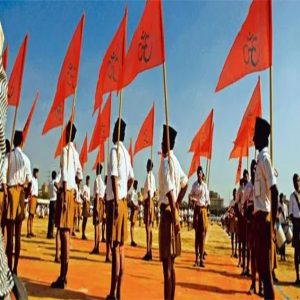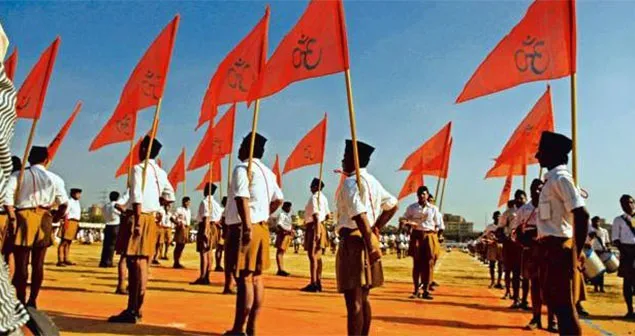
.png) Ram Puniyani
Ram Puniyani

RSS is the biggest organisation in the world. It aims towards a Hindu Rashtra and duplicitously claims that it is a cultural organisation. It is, as such, striving for a nationalism (Hindu) contrary to the one underlined in our Constitution, Indian Nationalism. It regards Hindus as a nation, so it has set its goal accordingly. Time and time again, one or the other top leader of the BJP voices the demand for scrapping the Indian Constitution and proclaiming that we should become a Hindu Rashtra. RSS Sarsanghchalak K Sudarshan himself had stated this when he became chief of RSS in 2000. Prior to the 2024 elections, BJP President JP Nadda stated that the BJP is self-sufficient and does not need RSS support for its electoral campaign, which was the norm until the previous elections. What do the pledge and prayer of RSS tell about its goal?
The role of RSS in shaping the BJP - its political progeny - can easily be discerned from the writings and actions of its leaders. One recalls that Shyama Prasad Mukherjee of Hindu Mahasabha collaborated with RSS to float the previous avatar of BJP, Bhartiya Jansangh. The then RSS chief MS Golwalkar (Guruji), regarded as its major ideologue, outlined the role of RSS-trained Swayamsaevaks and Pracharaks while being in Jana Sangh or BJP.
Golwalkar writes, "For instance some of our friends were told to go and work for politics that does not mean that they have great interest or inspiration for it. They don't die for politics like fish without water. If they are told to withdraw from politics, then also there is no objection. Their discretion is just not required." (Golwalkar, MS, Shri Guruji Samagar Darshan - Collected works of Golwalkar in Hindi, Bhartiya Vichar Sadhna, Nagpur, vol. 3, p. 33) tells us clearly that Jansangh or BJP was supposed to follow the instructions of RSS.
Further, Guruji says, "We know this also that some of our Swayamsevaks [cadres] work in politics. There they have to organise according to the needs of work: public meetings, processions etc., have to raise slogans." (Collected works Vol 4, page 4-5)
RSS nurtured and trained its swayamsevaks on these lines and later floated many organisations. Nathuram Godse, the killer of Mahatma Gandhi, was also a trained pracharak of RSS. RSS, at that time, did not keep any records of membership so it could wash its hands off this murder. Nathuram Godse's family believes that the assassin, a staunch member of the RSS, was neither expelled from the Sangh nor did he ever leave the organisation.
Shamsul Islam, eminent scholar of Hindu Nationalism, points out, "The central publication house of the RSS, the Suruchi Prakashan, Jhandewalan, New Delhi, published, Param Vaibhav Ke Path Par (1997) which gave details of more than 40 organisations created by the RSS for different tasks. The BJP, as a political organisation, figures prominently in number three. The ABVP, Hindu Jagaran Manch, Vishva Hindu Parishad, Swadeshi Jagaran Manch, Sanskar Bharti, etc., are also listed.
Similarly, the prayer and pledge of RSS make it clear that they make their followers commit to the Hindu nation. Its Prathana (Prayer) says, "You/O god almighty, we the integral part of the Hindu Rashtra salute you in reverence/For Your cause have we girded up our loins/Give us Your Blessings for its accomplishment" (RSS, Shakha Darshika, Gyan Ganga, Jaipur, 1997, p. 1). The pledge is also equally forthright in this: "I become a member of the RSS in order to achieve all-round greatness of Bharatvarsha by fostering the growth of my sacred Hindu religion, Hindu society, and Hindu culture. (p. 66)
The masquerading of RSS as a cultural organisation helps it expand by appealing to the emotions of many. Major leaders of the freedom struggle were very clear about the nature of RSS. "A member of Gandhi's entourage had praised the efficiency, discipline, courage and capacity for hard work shown by RSS cadres at Wagah, a major transit camp for Punjab refugees. Gandhi quipped back, 'but don't forget, even so had Hitler's Nazis and Fascists under Mussolini', Gandhi characterised RSS as a communal body with a totalitarian outlook' (Pyarelal, Mahatma Gandhi: The Last Phase, Ahmedabad, p 440).
Nehru regarded RSS as having traits of fascism. Dr Rajendra Prasad, the first President of India, had stated that "The RSS is strictly secret as regards its organisation. It has consequently developed along fascist lines and is definitely a potential menace to public peace (Dr Rajendra Prasad to Sardar Vallabh Bhai Patel, December 12, 1948).
Sardar Patel wrote, "As regards the RSS and the Hindu Mahasabha, the case relating to Gandhiji's murder… about the participation of the two organisations, but our reports do confirm that, as a result of the activities of these two bodies, particularly the former, an atmosphere was created in the country in which such a ghastly tragedy became possible… The activities of the RSS constituted a clear threat to the existence of the Government and the State. Our reports show that those activities, despite the ban, have not died down. Indeed, as time has marched on, the RSS circles are becoming more defiant and are indulging in their subversive activities in an increasing measure" (Letter 64 cited in Sardar Patel: Select Correspondence 1945-1950, vol. 2, Navjivan Publishing House, Ahmedabad, 1977, pp. 276-277).
We also recall that RSS has been banned thrice and wriggled out of those bans by wearing the façade of culture. The ban on government servants taking part in politics ensures that our bureaucracy remains committed to the values of the constitution and is not politically partisan. This ban on Government servants participating in RSS activities has been in place for over 50 years. It is the third time that this has been done.
Janata Party and Atal Bihari Vajpayee were also at the helm of political affairs, but this ban was not lifted. Mr Modi has been in power for the last 10-plus years. Why is he taking this decision now? Is it after RSS chief Mohan Bhagwat has been making oblique criticism of the supreme leader? Cultural activists and social scientists need to assess the contribution of RSS to Indian culture. This mask of RSS being a cultural organisation needs to be undone and its political agenda grasped for the protection of the Indian Constitution and democracy. As such, it is a supra-political outfit.